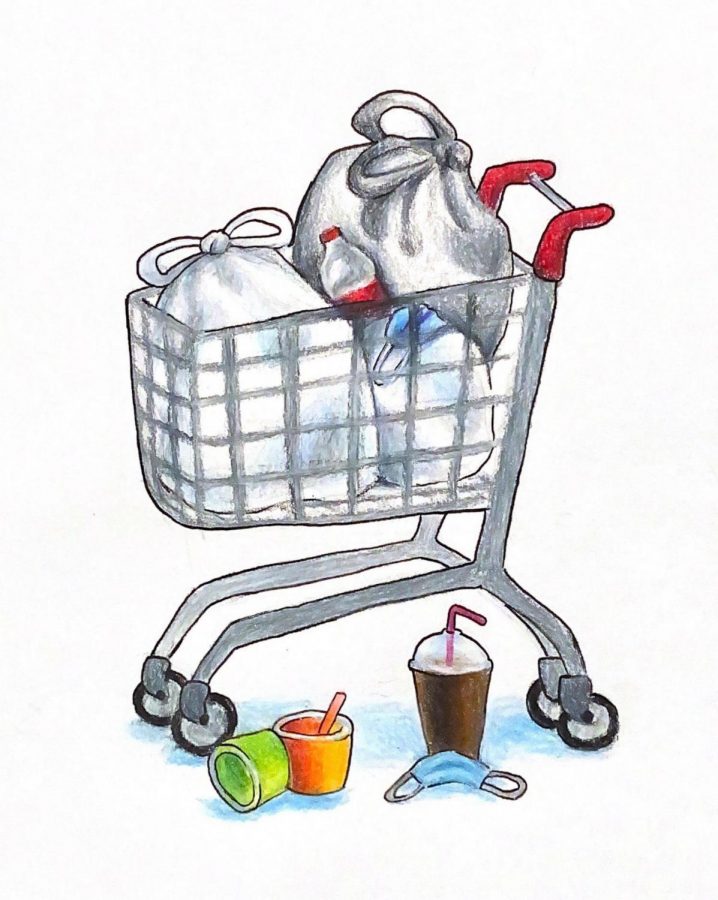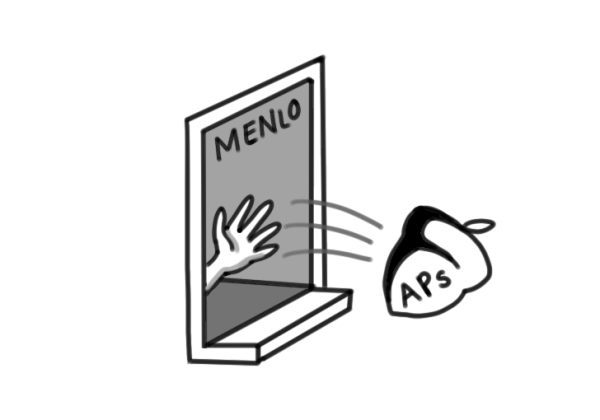Single-Use-Plastics Surge During COVID-19 Pandemic
During the coronavirus pandemic, plastic use has increased, and many bans on single-use-plastics have been temporarily repealed. Illustration courtesy of Marissa Li.
October 8, 2020
The COVID-19 pandemic has sparked a tidal wave of increased plastic usage. From the need for Personal Protective Equipment (PPE) to rollbacks on single-use-plastic bans, the pandemic has reversed recent progress on restricting plastic use, according to Scientific American.
A main contributor to the increase in waste is the use of disposable masks, gloves and other PPE. According to the American Chemistry Society, approximately 129 billion face masks and 65 billion gloves are now used monthly across the globe. A disposable mask has a lifetime of about 450 years, but no PPE can be recycled, according to The Guardian.
In order to combat pollution by PPE, some cities have instituted fines for the littering of PPE. Suffolk County, New York, passed a bill stating that people who improperly disposed of PPE could be fined up to $1,500, according to The Independent in New York.
In early March, oil prices dropped dramatically. Oil is a key raw material used to make plastics. Low oil prices have created greater price differences between oil and more expensive, sustainable alternatives. Consequently, if businesses want to stay financially competitive, it is less expensive for them to buy new plastic (plastic that has been created without any recycled materials), according to Scientific American.
During the first months of the pandemic, bans on reusable bags were instituted due to the uncertainty of what surfaces COVID-19 can survive on. The plastics industry capitalized on this uncertainty and backed claims indicating that single-use-plastics were the safest and most sanitary option for packaging. However, 119 scientists from 18 countries have signed a statement affirming that reusable containers do not increase the chance of virus transmission if cleaned thoroughly.
The takeout food industry is also heavily responsible for the influx of waste. With indoor dining closed, many people have turned toward takeout as an alternative. “We couldn’t go out to eat for a long time, but we still wanted to get food from some of our favorite restaurants,” sophomore Sydney Fish said. “So, we often picked up takeout from those restaurants during the early months of the pandemic.”
Although restaurants have been reopening in the past couple of months, mainly for outdoor dining, some restaurants that didn’t previously do so still offer takeout options. Typically, takeout containers are made of single-use-plastic, and customers are given plastic utensils.
In Singapore, there was an eight-week lockdown throughout April and May. During that period, Singapore’s 5.7 million citizens generated an additional 1,470 tons of plastic waste solely from takeout packaging, according to Today Online.
The pandemic has also caused a surge in online shopping, resulting from retail store closures, which leads to more plastic packaging usage. “Since the pandemic started, we’ve done way more online shopping, and the shipping of products sold online contains a lot of plastic waste,” senior Mallika Tatavarti said.
Retail stores have been able to reopen in a limited capacity; however, online shopping continues to be an alternative for those who want to avoid stores and crowds.
While efforts to reduce plastic were being made prior to the pandemic, some have been temporarily reversed. In 2014, the California state government banned plastic shopping bags; however, in the early stages of the pandemic, Executive Order N-54-20 put that law on hold in order to ensure health and safety. Plastic bags are one example among many in which progress to reduce plastic has been backtracked.
According to The Guardian, environmental issues may be dismissed during this time because there are an abundance of issues ranging from finance to health that appear to be more urgent which include unemployment, poverty and overall safety amid COVID-19.













